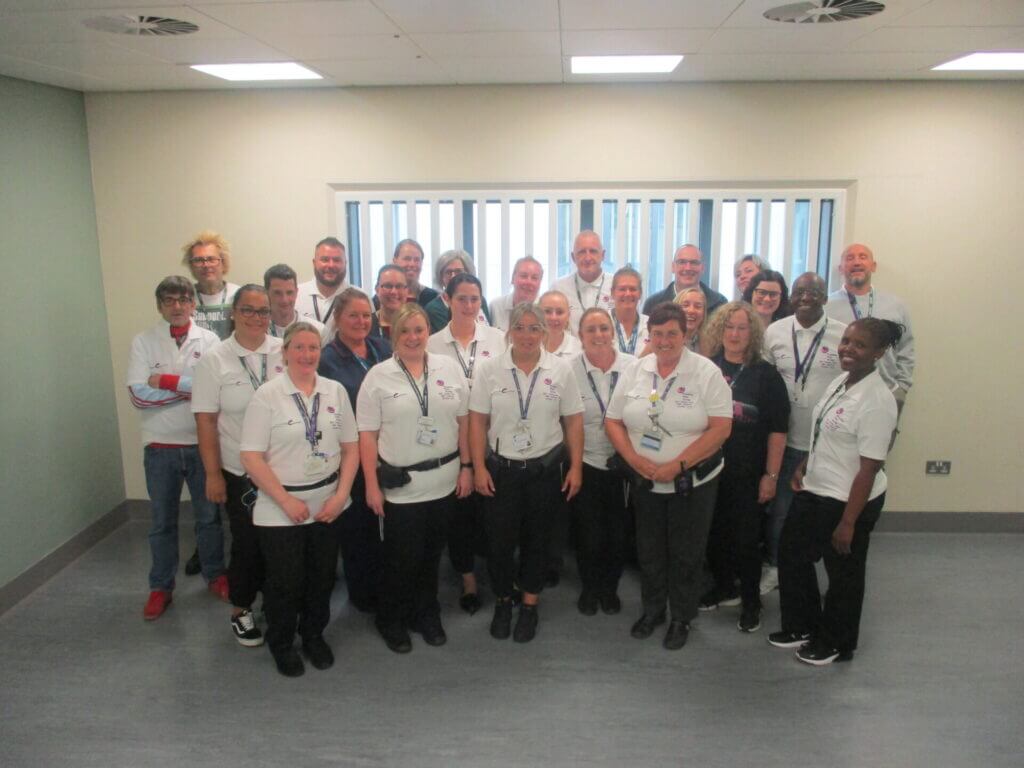An NHS England, private sector and charity partnership this week begins its largest ever hepatitis C screening programme. It is a vital step in England to eliminate hepatitis C in advance of the World Health Organisation (WHO) 2030 target.

The High Intensity Test and Treat (HITT) event at HMP Oakwood in Featherstone, West Midlands, is the latest in a programme run in partnership between Practice Plus Group, NHS England, HM Prison and Probation Service and the Hepatitis C Trust. Similar events have so far helped Practice Plus Group to achieve micro-elimination recognition by NHS England in 18 prisons throughout England.
Hepatitis C is a blood borne virus (BBV) that predominantly affects the liver and can cause cirrhosis and cancer. It chronically affects an estimated 80,000 people in England. Commonly transmitted through the sharing of drug paraphernalia, the prison population has a higher concentration of cases than in the community, with approximately 6% of the male population in English prisons and up to 20% of the female prison population affected, compared with 0.7% in the general population [Source: Hepatitis C Trust].
Prisons are therefore key to beating the virus, which can also be spread by sharing toothbrushes, razors, hair clippers and through unprotected sex. By diagnosing and treating at the earliest possible stage, patients’ lives are saved, transmission prevented both within prisons and in the wider community, and the hepatitis C burden on the NHS can be reduced.
Prison-based HITTs are part of a much larger and long running project called the National Blood Borne Virus Project, which Practice Plus Group has supported since 2018. The project is funded in part through NHS England’s strategic procurements with Gilead Sciences, one of the three pharmaceutical companies that manufactures and supplies medication to cure hepatitis C.
Clinicians from Practice Plus Group, the UK’s leading provider of healthcare services in prisons, and from each prison’s local NHS Trust, are partnered with peers from the patient-led organisation Hepatitis C Trust who have lived experience of imprisonment and treatment for the virus. The HITTS work in conjunction with ‘reception testing’, where new arrivals to prison are offered screening for hepatitis C, B, and HIV.
At HMP Oakwood, one of the largest prisons in Europe, the team are aiming to take finger-prick blood tests from at least 95% of the 2000 prisoners over five days. They will work in partnership with G4S who run HMP Oakwood, and University Hospitals Birmingham NHS Foundation Trust. Those who test positive for hepatitis C antibodies will then be tested using a ‘point of care’ Cepheid machine. These were also used to diagnose COVID during the pandemic, with results available in under an hour. Anyone who tests positive for hepatitis C will be offered treatment within three days. All prisoners will also be given harm reduction and infection prevention advice.
Dr Iain Brew, National Deputy Medical Director at Practice Plus Group, said: “Hepatitis C is a unique virus in that if left untreated, it will kill, and yet with treatment there is a 95 per cent chance of cure. Historically, screening involved a blood test which took weeks to return results, and the treatment had similar side-effects to chemotherapy. These factors combined meant there was poor uptake of screening, and treatment was difficult to tolerate and complete. Since 2019 when fast turnaround finger-prick tests were introduced, Practice Plus Group has increased uptake from around 25 per cent to over 90 per cent, and as a result have connected 2,000 people with treatment which, these days, is in oral tablet form and is very well tolerated. We have run HITTS in 17 prisons, and 18 prisons have received official micro-elimination recognition by NHS England, including all four of the women’s prisons we deliver healthcare in.”
Mark Gillyon-Powell, Head of Programme for Hepatitis C elimination in England, from NHS England, said: “This healthcare partnership has demonstrated that, even during a global pandemic, it is possible to achieve the micro-elimination of Hepatitis C in a defined setting. Maintenance of micro-elimination targets are essential if the UK is to achieve its elimination goal ahead of 2030. Given the often-short and repeated incarcerations, the priority in prisons is to ensure patients are diagnosed quickly, begin treatment quickly and are supported upon release.”
Sean Cox, Director of Prison Services at the Hepatitis C Trust, said: “The Hepatitis C Trust’s peer-led program is a successful way to reach the thousands of people that go through the prison system who might have hepatitis C. With testing and education workshops conducted by those with lived experience of hepatitis C, our peers are able to provide assurance that this disease is treatable and their presence and support can reduce the stigma that often comes with a positive test result. By testing, treating and educating people in prisons, we are on track to reach micro-elimination in this under-served population.”

